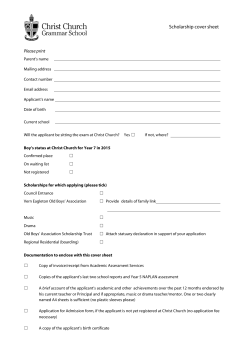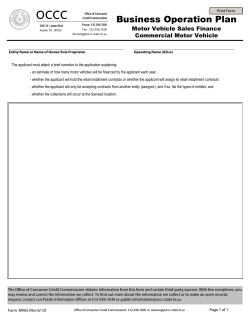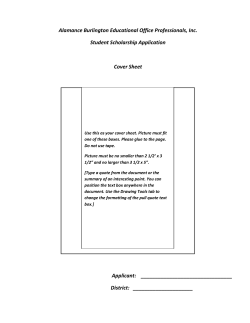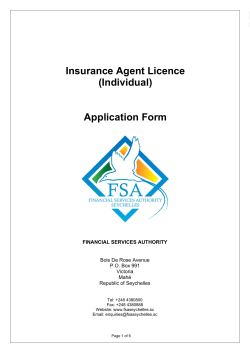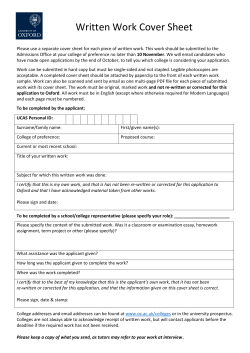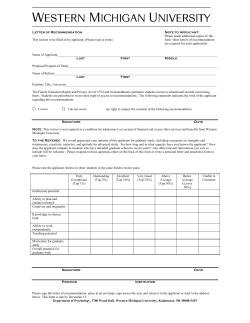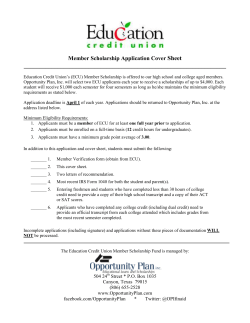
2015 NARSAD INDEPENDENT INVESTIGATOR GRANT Application Guidelines
2015 NARSAD INDEPENDENT INVESTIGATOR GRANT Application Guidelines Application Acceptance Period: October 8, 2014 – November 14, 2014 The Brain & Behavior Research Foundation is the largest non-government, donor-supported organization that distributes funds for brain and behavior disorder research. The Brain & Behavior Research Foundation NARSAD Independent Investigator Grant offers up to $50,000 a year for two (2) years and is intended for scientists at the associate professor level (or equivalent) with national competitive supports as a Principal Investigator (P.I.). Please note that an assistant professor who is a Principal Investigator (P.I.) on a NIH R01 grant is now eligible for the Independent Investigator Grant. The Independent Investigator Grant stands between the Young and Distinguished Investigator Grants. The Young Investigator is intended to extend initial research training, or support scientists at the assistant professor rank. The Distinguished Investigator supports senior investigators (full professor or equivalent) pursuing innovative, new directions. Strict adherence to eligibility guidelines for the Independent Investigator will apply to prevent overlap between the programs, and to ensure that a reasonable proportion of applications judged to be excellent can be funded. The program is intended to facilitate innovative research opportunities and supports basic, as well as translational and/or clinical investigators, however, research must be relevant to understanding, treatment and prevention of serious psychiatric disorders such as schizophrenia, mood disorders, anxiety disorders, or early onset brain and behavior disorders. As is well known, the Brain & Behavior Research Foundation is interested in supporting the full range of relevant neurobiological and psychobiological basic science. We also support clinical grants which can include careful studies using qualitative research approaches or research generating preliminary data to explore a new hypothesis generated by clinical experience or large sample studies. NARSAD Grants are not sufficient to support expensive large sample patient-based studies but it may be possible to attach a study to a clinical project already under way or for which other funding has become available. Some possibilities for preliminary clinical studies include: 1. Support for an add-on study to identify a biomarker in the context of an ongoing clinical trial. 2. Determining if a computer-based cognitive or other remediation enhances effectiveness of a treatment. 3. Proof of principle study in a small number of subjects to see if efficacy is detected with a new treatment. 4. Testing a novel hypothesis within an already established data set. 5. Research on productive work and other treatment outcomes. These examples do not define specific Brain & Behavior Research Foundation goals, but illustrate feasibility of expensive clinical research in the context of the NARSAD Grants program. The Brain & Behavior Research Foundation is committed to spending all contributions for direct research support. Operational expenses are generously underwritten by two family foundations. Administrative cost is small— reviewers are Scientific Council members who volunteer their time; therefore, no feedback can be provided. GRANT REQUIREMENTS: 1) Applicants must have a doctoral-level degree (M.D., Ph.D., etc.) and, if an associate professor (or equivalent), and have received, as P.I., competitive research support at a national level such as NIH, NSF, or major foundation support. An assistant professor who is P.I. on a NIH R01 grant is eligible for the Independent Investigator grant; 2) An applicant who currently has an active NARSAD Young Investigator grants, may not apply (NARSAD grants may not overlap in time—with the exception of no-cost extensions) Requirements from a previous grant must be met, and an applicant cannot submit more than one application per cycle; 3) Independent Investigators are eligible for only one Independent Investigator Grant. 4) Funding is for two years and is up to $50,000 per year. Funding of institutional overhead at an 8% rate (excluding equipment) is allowed and overhead must be included within the total budget request which may not exceed $100,000. Equipment, salary, and technical support are typical budget requests, but NARSAD wishes applicants to identify requirements specific to their research and setting; 5) A need for funding must be shown, and the applicant's institutional position must allow a minimum of 50% time for research. The applicant's institution must provide assurance that facilities and the investigator's time will be available to pursue the proposed work, if funded; 6) Applications must be submitted online by Friday, November 14, 2014 (11:59 p.m. Eastern Time). (Do not submit before Wednesday, October 8, 2014, 3:00 p.m. Eastern Time). 7) Notification of grants will be mailed in April 2015. It is NARSAD’s policy to provide no feedback on applications, other than funding notification. Earliest grant start date is September 15, 2015. Application should enable reviewers to determine eligibility; judge that independence and productivity are established; establish relevance of proposal to the Brain & Behavior Research Foundations mission; and estimate originality and scientific promise of the investigator. APPLICATION REQUIREMENTS: Applications must be submitted electronically via www.bbrfoundation.org as one document, be brief, typed in a font size no smaller than 11 pt., and include in the following order (please label each section accordingly, include applicant’s name in the upper right corner and submit a separate page for each): (a) Institutional Assurance - statement providing institutional assurance regarding applicant's time, availability of facilities, and future position if research is funded. This page must be signed by the applicant’s departmental chair or equivalent and include institutional signatures (i.e., Grants & Contracts/Sponsored Research Office), thereby signifying the institution's acceptance of these terms. The page must also state that applicant is an associate professor, or if not, specify how the current position is the associate professor equivalent in the host institution. This rank must be held at the time of the application (promotion will not negate the grant). If you are an assistant professor and P.I. on an NIH R01 grant this must be stated in the institutional assurance as well; (b) Abstract - a maximum 500 word description of the proposed research on a separate page written in terms understandable to lay people. Center the project title over the text. (Please be sure to place your name and institution in the upper right hand corner). If the proposal is funded, this material may be used in the Brain & Behavior Research Foundation announcements; (c) Proposal - a maximum of two pages to describe the project background and progress to date, clearly specify hypotheses, and outline the research plan. An absolute maximum of two pages standard type, with no appendices, is required (figures, tables, diagrams, et. al.., must be included within this page limit); (d) References (optional) - a separate page listing up to 10 bibliographical references; (e) Budget - a separate page of the budget description specifying the amount requested with a brief justification. Requests must not exceed $50,000 per year. Specific assurance that receipt of this grant will not result in duplication of funding is required. Other support (received or pending) must be included; (f) Collaborator Letter (optional) - letters of commitment from essential project collaborators (not solely letters of reference), addressed to the applicant briefly explaining the specific contribution and confirming a willingness to collaborate (only necessary if applicant will utilize collaborators). The scanned document/s depicting a signature should be submitted electronically; (g) CV – NIH-style biosketch or biography portion of the CV and bibliography. The “Grant Support” section of the CV must specify competitive funding which meets eligibility requirements for this Grant. ** IRB approval for human and animal subjects must be verified at time of the grant (do not include with application), as well as institutional acceptance of the Brain & Behavior Research Foundation Terms of Award. ** In fairness to all applicants, supplemental material and material exceeding the specified length will not be considered in the review process. Letters of reference/support will be treated as supplemental material. ** Funds will be granted to universities, institutions or medical research centers operating in the United States, Canada or any foreign countries. All international applicants are welcome to apply. Researchers need not be U.S. citizens. An automatic e-mail is generated upon submission of the electronic application. If you do not receive a confirmation, please contact grants@bbrfoundation.org. E-mailed, faxed, or mailed applications will NOT be accepted. If the Institutional Assurance or collaborator letter(s) cannot be scanned with signature(s), send to: Email: grants@bbrfoundation.org (answered daily) Website: www.bbrfoundation.org/II
© Copyright 2025






